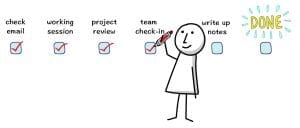Productivity & The Night Shift: Three Learnings That Transformed My Work Days
What 2 weeks of the overnight shift taught me about productivity and 9 to 5 success
I recently spent two weeks working overnight shifts to support client events in Germany and China. It was my first time ever working a swing shift and I was surprised by my productivity. Here are three key lessons I learned and how I see them translating into 9 to 5 life.
An email-free hour is productivity magic
 Late Night Lesson: I was amazed by how laser-focused I was between the hours of 2 and 6 a.m. In looking back to reflect, I realize a major part of the reason I was able to give my undivided attention to the tasks at hand is quite literally because my attention wasn’t divided. My house was quiet and, more importantly, so was my inbox. During those late night hours, I knew emails wouldn’t be pouring in like they normally do from 9 to 5, so I gave myself permission not to click away from my work to check it regularly. It was MAGIC! Not only did I complete my tasks more quickly, but the quality of the work was better because my brain had the freedom to kick into high gear without the hesitation that comes with knowing you might have to slow down or stop when a competing priority comes up.
Late Night Lesson: I was amazed by how laser-focused I was between the hours of 2 and 6 a.m. In looking back to reflect, I realize a major part of the reason I was able to give my undivided attention to the tasks at hand is quite literally because my attention wasn’t divided. My house was quiet and, more importantly, so was my inbox. During those late night hours, I knew emails wouldn’t be pouring in like they normally do from 9 to 5, so I gave myself permission not to click away from my work to check it regularly. It was MAGIC! Not only did I complete my tasks more quickly, but the quality of the work was better because my brain had the freedom to kick into high gear without the hesitation that comes with knowing you might have to slow down or stop when a competing priority comes up.
9 to 5 Translation: Challenge the unwritten (often self-imposed) rule that you need to read each email the moment it hits your inbox. If you were in a meeting it would be acceptable for you not to answer an email for the hour, so why not schedule a meeting with yourself? A golden hour of uninterrupted, focused work. Once you’ve carved out the time, do what you need to do to actually create the space to support it. Put your inbox offline, disconnect from Wi-Fi, put your phone in airplane mode, find a place away from your desk to work for the hour. Whatever steps you need to take to ensure your attention is undivided – take them.
Failing to plan = Planning to fail
 Late Night Lesson: My two weeks on the swing shift weren’t all smooth sailing – in fact, they got off to a pretty rough start. The first day or two, I ended up working both the day and night shifts because I hadn’t adequately communicated to those around me that I would be unavailable during traditional work hours. While I had put appointments on my calendar for the tasks I’d be working on overnight and told colleagues I’d be working swing shifts, I neglected to block my calendar from 9 to 5, so meetings and other commitments started to appear. The number of hours I worked those days wasn’t egregious, but they were spread throughout the day in a way that prevented me from having large enough blocks of time to recover and restore for the next shift. Once I blocked the time I planned to be offline on my calendar, this work schedule became much more manageable.
Late Night Lesson: My two weeks on the swing shift weren’t all smooth sailing – in fact, they got off to a pretty rough start. The first day or two, I ended up working both the day and night shifts because I hadn’t adequately communicated to those around me that I would be unavailable during traditional work hours. While I had put appointments on my calendar for the tasks I’d be working on overnight and told colleagues I’d be working swing shifts, I neglected to block my calendar from 9 to 5, so meetings and other commitments started to appear. The number of hours I worked those days wasn’t egregious, but they were spread throughout the day in a way that prevented me from having large enough blocks of time to recover and restore for the next shift. Once I blocked the time I planned to be offline on my calendar, this work schedule became much more manageable.
9 to 5 Translation: Planning the work itself isn’t enough. To truly thrive, our plans also need to address the contextual elements that will set us up for success. Do you need 30 minutes to clear your head before an important meeting? Schedule it! Is your work environment uninspiring? Switch it up! Most importantly, be sure to communicate what you need to those you work with and ask them what they need from you to create the most productive atmosphere possible.
A clear definition of “done” is essential
 Late Night Lesson: One of my biggest concerns about working the swing shift was that I wouldn’t be able to quiet my mind and fall back asleep after being so engaged in work all night. I was absolutely shocked when I fell asleep almost instantly after my head hit the pillow at the end of each shift – not because I was so exhausted, but because I had closed out the shift knowing I had done exactly what I set out to do. Having a clear definition of “done” – a set list of tasks I needed to complete by the end of each shift – allowed me to go to sleep knowing there were no loose ends, no potential “gotcha” moments that would be waiting for me when I woke up. It also provided a clear guideline for when it was okay to pack up the laptop and stop working for the night.
Late Night Lesson: One of my biggest concerns about working the swing shift was that I wouldn’t be able to quiet my mind and fall back asleep after being so engaged in work all night. I was absolutely shocked when I fell asleep almost instantly after my head hit the pillow at the end of each shift – not because I was so exhausted, but because I had closed out the shift knowing I had done exactly what I set out to do. Having a clear definition of “done” – a set list of tasks I needed to complete by the end of each shift – allowed me to go to sleep knowing there were no loose ends, no potential “gotcha” moments that would be waiting for me when I woke up. It also provided a clear guideline for when it was okay to pack up the laptop and stop working for the night.
9 to 5 Translation: Rather than a running list of “to do’s” that carries over from day to day leaving you always feeling like there’s “just one more thing” you should do before calling it quits for the day, try starting each morning by making a list of “must do’s” for the day. What key tasks must you accomplish before you can consider yourself done for the day? Keep the list short and realistic. Of course there will be other things you work on throughout the day, but these are the few, non-negotiable items on your list that will enable you to close the laptop at the end of the workday feeling like you’ve done what you set out to do.
Overall, I have to say I really enjoyed my time working the overnight shift. What initially felt like taking one for the team actually turned out to be a refreshingly productive, focused time for me. I’m excited to take this new perspective back into my 9 to 5 routine and hope that these lessons will be helpful to you, regardless of what time of day you find yourself working.